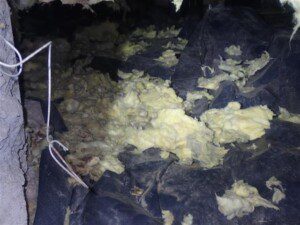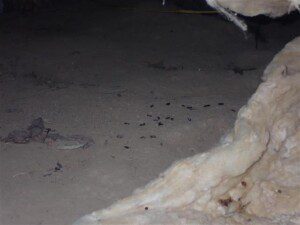Homes are designed to keep many things out including water, excessive heat or cold, inclement weather, and pests. While homes are good at keeping most of these things out, there are always some chinks in the armor. Pests in a home are generally described as an animal that can cause harm to a home or its occupants and there are many different types that cause problems in different ways.

Rodent damaged insulation.
One of the most common groups of pests that plague many homes are mice and rats. These rodents are phenomenal at finding even the smallest of gaps in a home (rats can fit through a hole the size of a quarter and mice can fit through a hole the width of a pencil) and making their way inside. Not only can these pests cause significant damage to insulation and building materials, they can also spread disease and other pests that are present in their fur and droppings.
The process of keeping mice and rats out of your home can be broken into roughly three categories:
1. Preventing access
2. Minimizing attraction
3. Creating deterrents
Since these rodents are very good at squeezing through even the smallest of gaps, checking the perimeter of your home regularly for gaps through the foundation, siding, and eaves and sealing them up accordingly is imperative. Sealing gaps with regular sealant or spray foam is not usually enough as rats can often chew through this material with ease. In fact, some studies have shown that rats bite with more force per square inch than sharks and alligators. Steel wool, hardware cloth, and pest deterrent caulking are products that can limit the ability of rats and mice to penetrate the exterior of a home. However, dedicated rats have been known to even chew through bricks and concrete so the next step of minimizing the attractiveness of your home to these rodents is equally as crucial.

Rodent droppings in crawl space.
Rats and mice will eat a wide variety of different items and any discarded food or garbage on your property will act as a dinner bell. Keep your garbage cans covered and clean up fruits or vegetables that fall onto the ground in your garden to avoid attracting rats or mice close to your home. In addition, feed your outdoor pets during the day and clean up any leftover food before nightfall. Keeping shrubs and trees trimmed back away from your home and remove debris from around your property to avoid giving rodents a place to hide.
Lastly, setting up rodent traps and poison centers around your home can help to keep the rat and mouse population under control around your property. Place these strategically in areas that rodents tend to congregate or travel along (straightaways along foundation walls are common areas). Make sure poisons are only used outdoors and are in child and pet proof containers or in areas out of reach.
